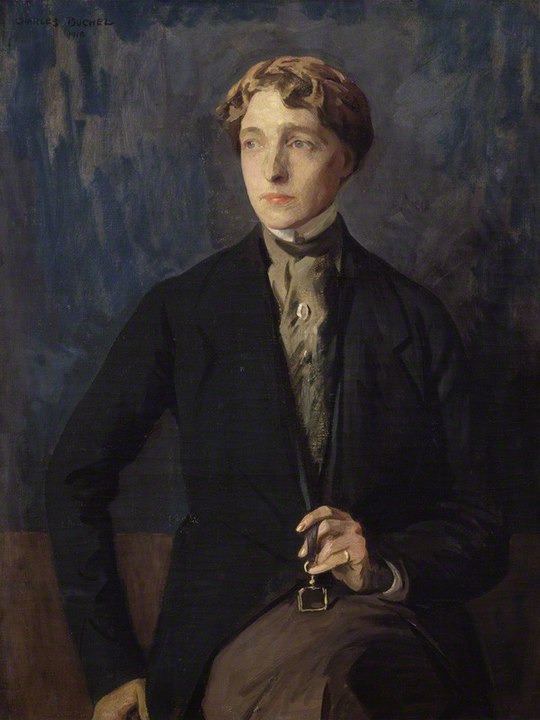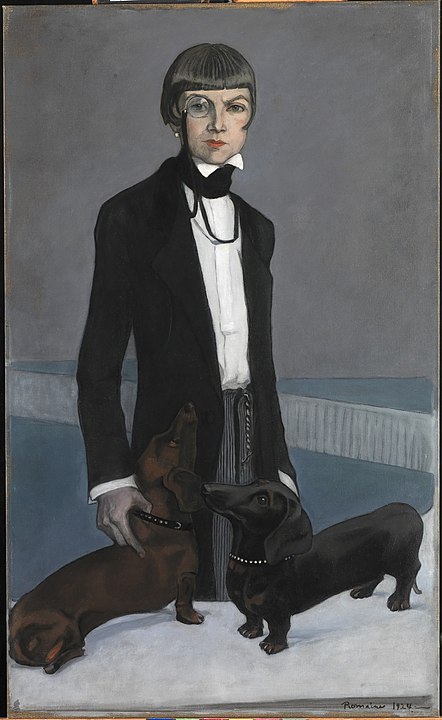Returning to London on Monday 2 January, for the next two weeks the Woolfs saw only their most intimate, including Vita (with whom VW stayed with at Long Barn the night of 14 January), and VW remained immersed in writing “Orlando”. Like the previous, Diary XVII is also written on loose-leaf paper.
diary xvii: 17 January 1928-18 December 1928
52 Tavistock Square, London.
Tuesday 17 January 1928: All about Hardy; even when it’s not, and rather her meandering thoughts during archaic proceedings – a letter from Max Beerbohm, lectures to be written for Newnham (more about that later – enough to say these would evolve into legend and A Room of One’s Own). The Woolf’s had attended Thomas Hardy’s funeral on the previous day – or at least the interment of his ashes in Poet’s Corner at Westminster Abbey. All very ‘humbug’ in her opinion, and death – as it always does – has her thinking of the futility of life. Virginia’s essay on Hardy, long commissioned and in preparation – awaiting its moment – would be published as the lead article in the the TLS on 19th January 1928, and would find its way into The Common Reader Second Series as “The Novels of Thomas Hardy”. At the same time she was writing on George Meredith, and this essay would be published in the TLS on 9th February (reprinted also in the CR 2) On 11 February she explains how Hardy and Meredith and the “futility of it all” had led her to her bed. The description is painful to read but I think essential to the contemplation of the debilitating nature of her ailment(s):
[…] I know the feeling now, when I can’t spin a sentence, & sit mumbling & turning; & nothing flits by my brain which is as a blank window. [So I…] go to bed, stuffing my ears with rubber; and there I lie […] what leagues I travel in the time! Such ‘sensations’ spread over my spine & head […] such an exaggerated tiredness; such anguishes & despairs; & heavenly relief & rest; & then misery again. Never was anyone so tossed up & down by the body as I am, I think[…]
p.174
And, then, “it is over” and reality takes over. Vita’s father had died on the 28th January, and she passes by Knole with Vita – but this time death inspires thoughts of history and of “Orlando” and the final chapter with which she is struggling, and wondering generally whether the story is not just too long and fantastical.
On 18th February, VW visits the aged and ailing Jane Harrison at Mecklenburgh Square, but does not further exacerbate – only the footnote reminds me that in the last years Hope Mirrlees has been absent from Woolf’s circle – or at least not, or rarely, mentioned by her – but then there was never really one Woolf circle rather concentric circles with her at their center.
18th March 1928: One calendar month on – a duration explained by the suggestion of head ache and a misplaced writing board – “Orlando” done, “The End” a reality! But not yet taken seriously: “…it is all a joke […] a writer’s holiday” [p.177]. And, perhaps never to be by her. Somewhat darkly, Virginia is reluctant to plan into the next year, after all “…I may be dead by then, I think” [p.177]. But, nevertheless, is looking forward to an imminent trip to Cassis to visit with Vanessa and her extended (!) family, and to the summer months that they will return to.
On Monday 26th March the Woolfs cross the channel to Dieppe, and then make the long drive southward through France, arriving in Cassis on Sunday 1st April. They take rooms at the Château de Fontcreuse owned by the British officer, Colonel Teed, but dine and spend most of their time with Vanessa et.al. nearby at La Bergère.
From the bottom of page 55 of the above publication (it is likely you will have to go to Google Books and do a search) are some informative paragraphs on Colonel Teed and his château and Vanessa’s new winter retreat. (Beyond that, the preview actually suggests a very worthwhile read.)
The Woolfs returned to England on 16th April and Virginia’s entry on the next day, Tuesday 17 April, begins with reminisces of their journey and ends with a chance meeting with a distraught Hope Mirrlees in St. George’s Field and the news of Jane Harrison’s death. Saturday 21 April: The Woolfs attended Harrison’s funeral on 19th April – which moved VW only to comment on what a dismal affair it was. That evening they dined with the Keyneses – an affair she did find amicable: “…two couples, elderly(!), childless, distinguished…[Maynard] not with us pompous or great: simple, with his mind working always …” [p.181].
In the very few entries during May and June Woolf is intermittently reading Proust, looking over Orlando, receiving a positive reaction from Leonard, and wanting to move on. On 20 June her affection for her nephew Julian (Bell), who will be dining with them and Sylva Norman whose novel Nature Has No Tune the Woolfs were about to publish, is obvious and besides: “[Julian] has his instincts sane & normal….But my tooth is aching.” p.187] The prospect of the evening led her to further say: “…that is what I’m ripe for – to go adventuring on the streams of other peoples lives – speculating, adrift” [p.187]. Whether Aunt Virginia is matchmaking here I don’t know. Speculative.
Saturday 7 July: Katherine Mansfield has been dead for over five years, and Virginia confides, and is even perplexed, that she dreams so vividly of her still. She had visited Long Barn the previous day, so we can not help but be left to wonder whether KM and Vita dwell in the same realm of VW’s consciousness. Returns to work on a piece about Laurence Sterne’s A Sentimental Journey (pub. in the New York Herald Tribune, 23 September 1928 and, as I mentioned in this post, the introduction to the Oxford World Classics edition in 1928. Also reprinted as The “Sentimental Journey” in The Common Reader Second Series.)
Monks House, Rodmell
Virginia and Leonard went to Rodmell for their summer sojourn on 24th July and the first entry is on Wednesday 8 August in which (with Eddy Sackville-West as subject) she ponders human existence – its purpose, what it leaves behind, and in fact, seemingly inspired by the warmth of the summer air and country quiet, she is reflective – philosophically and in terms of her writing – all through August. She again is collecting together her thoughts and musings on that “book on fiction” that has possessed her for some time now. A visit to Dorothy Wellesley’s new house, Penns-in-the-Rocks, near Tunbridge Wells, gives VW the opportunity to be envious and self-righteous at the same time. And concludes she much prefers the trees and foliage surrounding Monks than gigantic sandstone boulders. And oh, how Woolf enjoys each of the summer days at Rodmell, waxing on nature’s beauty. Then, on the last day of August, we get an account of a ribald – and drunken! – discussion with Forster, inspired it seems by The Well of Loneliness, the controversial lesbian love story by Radclyffe Hall that had just been published and then withdrawn.


As a topical matter of interest, with so-called “conversion therapy” being debated in the UK in these times, I was taken by Forster’s assertion that a certain Dr. Head “can convert the sodomites” [p.193] A footnote informs us that this same Sir Henry Head had been consulted – following a recommendation by Roger Fry – during Virginia’s suicidal state in 1913. What this says about the medical advice and treatment that Woolf received then, and throughout her life, I dare not dwell on, nor deem to make any association with ‘head’ doctors of the day. Shh … I only muse unto myself.
